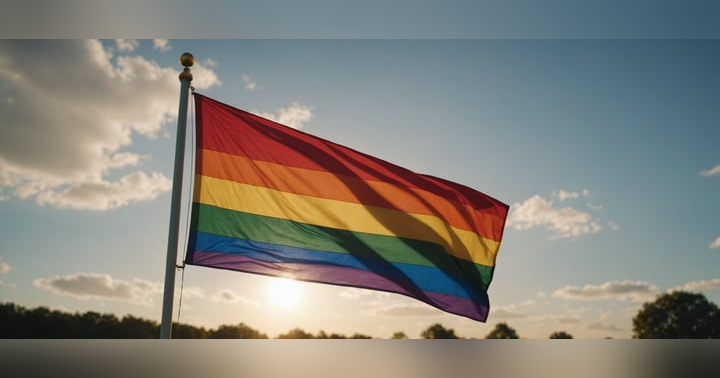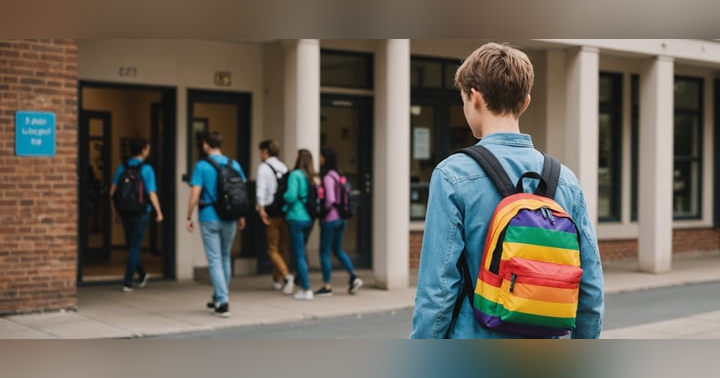The Ripple Effects of the "Don't Say Gay" Bill on LGBTQ+ Communities

Dear Florida: We're Here. We're Queer. Get Used to It.
Throughout 2022, Florida's "Don't Say Gay" bill, officially titled the Florida Parental Rights in Education Act, dominated headlines and ignited nationwide debates. The controversial law has negatively impacted LGBTQ+ students and families in Florida’s public schools by limiting discussions of sexual orientation and gender identity.
Today, the law remains in effect, and similar restrictions have spread to other states, intensifying national conversations about LGBTQ+ rights in education. Ongoing legal challenges persist, but the bill has already led to self-censorship in schools and raised serious concerns about the mental health of LGBTQ+ youth.
A Deep Dive into the Don’t Say Gay Bill
To fully understand the implications of Florida's "Don't Say Gay" bill, it's important to break down its core components and how they directly affect the classroom and school policies.
Its three key provisions are:
- Ban on Classroom Instruction: The law prohibits any instruction related to sexual orientation or gender identity for students from kindergarten to third grade in Florida public schools.
- Age-Appropriate Limitations: For older students, discussions about sexual orientation or gender identity must be deemed age-appropriate according to state standards, though the definition of “appropriate” remains vague.
- Parental Access to Records: Schools are now prohibited from restricting parents’ access to their children’s education and health records, effectively increasing parental control over information shared with students.
While these points may seem broad, their potential impact on LGBTQ+ students, families, and educators is profound.
The Bill’s Origins
Florida State Senator Dennis K. Baxley introduced the bill in January 2022. Baxley, known for his anti-LGBTQ+ views, has a history of making inflammatory anti-LGBTQ+ statements. For instance, he once claimed that marriage equality threatened American families and refused to repeal a statute banning same-sex adoption, citing that he “couldn’t affirm homosexuality.” Baxley even equated LGBTQ+ parents with abusive or alcoholic families, painting a disturbingly biased picture of non-heteronormative households.
Though Baxley’s bill initially stalled, it found new life when Florida State Representative Joe Harding introduced a companion bill in the House. Despite opposition from numerous organizations, including the American Bar Association and Equality Florida, the bill passed the Florida House on February 24, 2022, and the Florida Senate on March 8. Governor Ron DeSantis signed it into law on March 28, with the legislation taking effect on July 1.
Disney's Role in the Controversy
Disney, one of Florida’s most influential corporations, faced backlash for its initial silence on the bill. Many—including some of its employees—expected the company, with its substantial LGBTQ+ fanbase and workforce, to oppose the legislation. Given Disney's status as one of Florida's largest commercial entities, many believed the company had the power to influence change.
After pressure from employees and activists, Disney’s then-CEO Bob Chapek finally spoke out on March 10, 2022, albeit some felt it was too little, too late. He reached out to Florida Governor Ron DeSantis on March 9, stating his "disappointment and concern" that the legislation could unfairly target LGBTQ+ children and families.
Chapek also announced that Disney was reassessing its approach to advocacy, including its political contributions in Florida and beyond. He revealed that Disney signed the Human Rights Campaign's statement opposing similar legislative efforts and pledged $5 million to organizations working to protect LGBTQ+ rights, including the Human Rights Campaign.
However, the HRC declined the funds at that time, stating they would not accept money from Disney until the company demonstrated a commitment to working with LGBTQ+ advocates to prevent harmful proposals like Florida's bill from becoming law.
The Hypocrisy of Heteronormativity
For decades, schools have subtly reinforced ideas about sexual orientation and gender roles, even in early childhood. Think about it—how many young girls were told that if a boy picks on them, it’s because he has a crush? It’s a problematic lesson, teaching kids to equate mistreatment with affection. And how many of us were constantly exposed to straight couples in books, TV shows, and movies, as if heterosexual relationships are the default?
Boys were often pushed toward "boyish" toys like trucks, while girls were encouraged to play with dolls, reinforcing rigid gender norms. And when it comes to education, most of us learned exclusively about straight history. Did anyone hear about the Stonewall Riots in school? Or how Alan Turing, who helped crack Nazi codes during WWII, was chemically castrated for being gay?
This all raises an important question: What exactly is considered "developmentally appropriate" for students, as outlined in laws like Florida’s "Don’t Say Gay" bill? The interpretation of such standards seems to be vague and open to bias.
Negative Implications for LGBTQ+ Youth
Critics of Florida's "Don't Say Gay" bill, including legal experts, argue that its vague language opens the door for lawsuits against school districts and teachers by parents who may claim that any mention of LGBTQ+ people or issues is not "age-appropriate." This poses serious risks for LGBTQ+ youth, who already face significantly higher rates of mental health challenges and suicide than their cisgender or straight peers. According to The Trevor Project's 2022 National Survey on LGBTQ Youth Mental Health, 45% of LGBTQ youth considered suicide in the past year, and 60% were unable to access the mental health care they needed.
By erasing LGBTQ+ identities from schools, critics warn that these students will feel even more isolated, and the impact could extend beyond the classroom. For instance, what happens when students with same-sex parents are involved? Would these parents be barred from school events for "exposing" children to LGBTQ+ themes?
Disturbingly, the original bill also included a provision requiring schools to out students to their parents within six weeks if they discovered a child’s sexual orientation or gender identity through counseling or other services. Critics argue that forcing someone to come out against their will is dangerous, especially for kids who may stay closeted to protect themselves from intolerant home environments. Fortunately, this provision was removed before the bill was signed into law, but its inclusion in early drafts still raises concerns about the overall impact of such legislation.
Nationwide Impact of “Don’t Say Gay” Legislation
Shortly after the "Don't Say Gay" bill went into effect, some Florida schools quickly adopted related practices that further marginalize LGBTQ+ students. For instance, the Leon County School Board unanimously approved its LGBTQ Inclusive School Guide, which includes a provision requiring schools to notify parents if a student is open about their gender identity in physical education classes or during overnight school trips. This not only outs students to their parents but also to the parents of their classmates, raising significant concerns about privacy and safety.
Additionally, the guide allows parents or students to request accommodations for rooming assignments during overnight events based on religious or privacy concerns, effectively enabling further ostracization of LGBTQ+ youth in the name of supposed moral values.
Reports from the Orange County Classroom Teachers Association reveal that school officials have warned educators against wearing rainbow attire or displaying photos of their same-sex spouses in classrooms. Similarly, Duval Public Schools removed a 12-minute anti-bullying video designed to teach middle and high school students how to support their gay and transgender peers.
The School District of Palm Beach County took this a step further by sending out a questionnaire to teachers, asking them to scrutinize all course materials for any references to sexual orientation, gender identity, or even race. This focus on policing curriculum reflects a broader trend of book bans across various states targeting LGBTQ+ themes.
The Ripple Effect of "Don’t Say Gay" Legislation
While Florida's "Don't Say Gay" bill garnered significant attention, it is far from the only state that enacted similar legislation. Between January and April 2022, approximately 20 states introduced "Don't Say Gay" laws, reflecting a growing trend of restricting discussions around LGBTQ+ topics in schools.
In April 2022, Alabama Governor Kay Ivey signed House Bill 322 into law, prohibiting public school teachers from discussing LGBTQ+ history or individuals in elementary schools. This move aligns with Alabama’s long history of anti-LGBTQ+ legislation, including a 1992 education code that required teachers to assert that homosexuality is not an acceptable lifestyle for the general public.
Since 1991, Texas has enforced a similar bill, mandating that educational materials for minors state that homosexual conduct is both unacceptable and a criminal offense. However, Oklahoma holds the distinction of being the first state to implement such a law, having passed legislation in April 1987 that banned teachers from discussing homosexuality in the context of AIDS education. Shortly thereafter, Louisiana enacted a comparable measure.
In addition to Alabama and Texas, states like Arizona, South Carolina, and Utah also adopted "Don't Say Gay" laws. Between 1987 and 2001, nine states passed laws preventing schools from teaching about homosexuality. Notably, Mississippi's sex education law requires that teachers instruct students solely on state laws related to sexual conduct, listing homosexuality alongside sensitive subjects like forcible rape and child support.
Taking Action Against LGBTQ+ Discrimination
While anger and frustration are natural responses, one concrete way to enact change is by voting in every election—not just presidential ones. Local elections have a significant impact on legislation that directly affects our communities, and we must ensure we’re electing officials who support the rights and dignity of LGBTQ+ individuals.
For business owners and advocates, the Human Rights Campaign and Freedom for All Americans have launched a National Business Statement on Anti-LGBTQ+ State Legislation, calling on leaders to oppose discriminatory laws. Companies can also join the fight by signing this statement and publicly supporting LGBTQ+ rights.
Speaking Out Against Anti-LGBTQ+ Legislation
The Florida Parental Rights in Education Act and similar legislation in other states mark a troubling escalation in anti-LGBTQ+ rhetoric, and it’s natural to feel concerned. We may even feel a profound sense of anger, and justifiably so—this is an attack on our community and our shared history. It targets not only our inner child but also today’s LGBTQ+ youth, who deserve a safe and supportive environment.
That's why it’s crucial to share information about these harmful developments with friends and family, raising awareness about their impact on the LGBTQ+ community both nationally and locally. Additionally, pay attention to politicians and their platforms to ensure your loved ones are not supporting candidates who oppose our rights.
Stay informed about local elections, register to vote, and be proactive. While confronting these issues can be frustrating, remember that we are not going anywhere. Anti-LGBTQ+ legislation cannot erase our existence unless we allow it to. We will continue to raise our voices, advocating for justice and equality in the face of adversity.
And remember. Every day is all we have, so you've got to make your own happiness.
For more information on this topic, listen to Episode 20. Don't Say Gay.
Tune into your favorite podcast player every Tuesday for new episodes of A Jaded Gay.


















